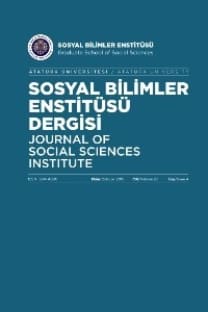Postmodern landscape: Postmodernist discourse in Mark Ravenhill's Shopping and Fucking
1990 sonrası çağdaş İngiliz oyun yazarları arasında Mark Ravenhillin özel bir yeri vardır. Toplumun coşkulu bir destekçisi ve çağdaş tiyatronun bir tür putkıranı olan yazar, Thatcher sonrası tiyatronun en gizemli kalemidir. Hiç kuşkusuz onun dramatik söylemi postmodern dönemin en keskin olanıdır. Mark Ravenhill oyunlarında, tüketim olgusunun toplumun her kesimini etkilediği postmodern bir manzara oluşturur. Ustalık dolu oyunu Shopping and Fuckingde de karamsar bir postmodern atmosfer yaratmıştır. Bu makalenin amacı, Ravenhillin Shopping and Fucking oyunundaki postmodernist söylemi açığa çıkarmaktır.
Postmodern manzara: Mark Ravenhill in Shopping and Fucking Adlı oyununda postmodernist söylem
Among contemporary dramatists of the 1990s, Mark Ravenhill has a unique place. As an enthusiastic supporter of the society and an iconoclast of modern drama he is the most original and enigmatic writer of the post-Thatcher generation. Ravenhill s dramatic voice is indisputably the strongest of the postmodern era. He creates a postmodern landscape where the influence of consumerism can be felt everywhere in society. In his most masterly work Shopping and Fucking he created a dark vision of postmodern atmosphere. This article aims at revealing a critical appraisal of postmodernist discourse reflected in Ravenhill s Shopping and Fucking.
___
- Baudrillard, J. (1989). The Anorexic Ruins in Looking Back on the End of the World, edited by Dietmar Kamper and Christoph Wulf, Trans. David Antal, New York: Semiotext (e), pp. 29-45.
- Billingham, P. (2007). At the Sharp End, London: Methuen.
- Billington, M. (2007). State of the Nation: British Theatre Since 1945, London: Faber and Faber.
- Cavendish, D. (27 September 1996). On Theatre, Independent.
- DMonte, R. (2008). Thatchers Children: Alienation and Anomie in the Plays of Judy Upton, in Cool Britannia?: British Political Drama in the 1990s, edited by Rebecca DMonte and Graham Saunders, London: Palgrave Macmillan, pp. 79-95.
- Lyotard, J.F. (1984). The Postmodern Condition: A Report on Knowledge, Trans. Geoff Bennington and Brian Massumi, Manchester: Manchester University Press.
- Mcgrath, J. (2002). Naked Thoughts that Roam About: Wrestling with Theatre, 1959- 2001, New York: Theatre Communications Group.
- Monforte, E. (2007). Mark Ravenhill, in British Theatre of the 1990s: Interviews with Directors, Playwrights, Critics and Academics, eds. Mireia Aragay, Hildegard Klein, Enric Monforte, and Pilar Zozaya, New York: Palgrave Macmillan, pp. 91-104.
- Osborne, J. (1957). Look Back in Anger. London: Faber and Faber.
- Ravenhill, M. (2001). Mark Ravenhill Plays 1: Shopping and F***ing, Faust is Dead, Handbag, Some Explicit Polaroids. London: Methuen.
- Ravenhill, M. (22 March 2003). A Touch of Evil. Guardian.
- Ravenhill, M. (2009). Foreword, in Dan Rebellato, Theatre and Globalisation, London: Palgrave Macmillan, pp. ix-xiv.
- Rebellato, D. (1996). Commentary, in Mark Ravenhill Shopping and F***ing, London: Methuen, pp.xii-xliii.
- Rebellato, D. (2001). Introduction, in Mark Ravenhill Plays 1: Shopping and F***ing, Faust is Dead, Handbag, Some Explicit Polaroids. London: Methuen, pp.ix-xx.
- Rebellato, D. (2009). Theatre and Globalisation. London: Palgrave Macmillan.
- Sierz, A. (2000). In-Yer-Face Theatre British Drama Today. London: Faber and Faber.
- Sierz, A. (2006). The Theatre of Martin Crimp. London: Methuen.
- Sierz, A. (2011). Rewriting the Nation: British Theatre Today. London: Methuen.
- Urban, K. (2008). Cruel Britannia, in Cool Britannia?: British Political Drama in the 1990s, edited by Rebecca DMonte and Graham Saunders. London: Palgrave Macmillan, pp. 38-55.
- Wandor, M. (2001). Post-War British Drama: Looking Back in Gender. London: Routledge.
- ISSN: 1304-4990
- Yayın Aralığı: Yılda 4 Sayı
- Yayıncı: Atatürk Üniversitesi Sosyal Bilimler Enstitüsü Müdürlüğü
Sayıdaki Diğer Makaleler
Türkiye'de bazı yatırım fonlarının performans değerlemesi
O Berna İPEKTEN, Nouhali MARDOMKHAH
Sırça Fanus’ta Esther’in İntiharının Anne Rahmine Geri Dönme Çabası Bağlamında İncelenmesi
Aile İçi Şiddet: Bir Kamu Politikası Analizi
Sırça Fanus'ta Esther'in İntiharının anne rahmine geri dönme çabası bağlamında incelenmesi
Erzurum Şehrinin Su İhtiyacının Karşılanmasında Palandöken Barajının Yeri ve Önemi
Paul Karl Feyerabend’in Çoğulcu Eğitim Felsefesi
Dede Kâtip ve İran Türk Edebiyatındaki Yeri
Alman ve Türk Gençlik Dilleri ile İlgili Karşılaştırmalı Bir Çalışma
İngilizce öğretmenliği bölümündeki pedagojik derslerin programları: Bir son değerlendirme
